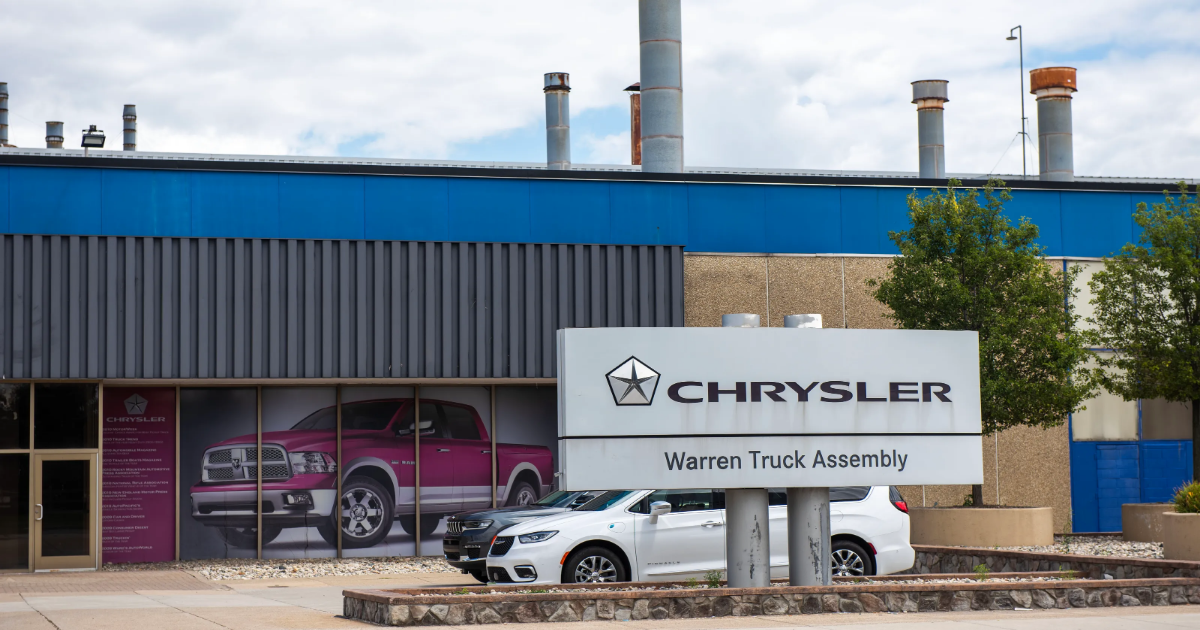Stellantis NV will pause vehicle production for several weeks at its Warren Truck Assembly Plant in a move the automaker said isn’t tied to other tariff-related factory cuts it announced Thursday.
“Due to an internal shortage of engines, Stellantis is allocating all available volume to support production of the Ram 1500 at the Sterling Heights Assembly Plant,” Stellantis said in a statement from spokesperson Jodi Tinson. “As a result, the Warren Truck Assembly Plant will be down beginning April 14, 2025. The plant is expected to resume normal production in early May.”
The plant builds the Jeep Wagoneer and Grand Wagoneer SUVs. Eric Graham, the president of United Auto Workers Local 140, which represents workers at the factory, said he expects production to pause for four weeks.
The 3.0-liter Hurricane twin-turbo six-cylinder engine used in Warren Truck’s Jeep Wagoneer is also needed for the Ram 1500 pickup built at nearby Sterling Heights Assembly Plant, and the automaker has been routing more of them to build pickups lately, the union leader said.
The engines are made at a plant in Saltillo, Mexico, but Graham noted the shortage problem began before President Donald Trump’s tariffs began taking effect. The automaker said the Warren Truck shutdown isn’t related to other moves it announced Thursday to idle plants in Mexico and Canada and lay off about 900 workers.
Graham said the plant — which operates on a single production shift — also is grappling with slow orders of the Wagoneer and Grand Wagoneer lately. Paired with the engine shortage, it’s translated to some shortened work weeks recently for workers.
Pausing production for several weeks means more than 1,000 workers will be temporarily laid off, Graham said. Several hundred other employees who help repair Ram 1500 pickups from Sterling Heights will continue to work in a different section of the plant.
About 1,300 Warren Truck workers are already on indefinite layoff after production of the Ram 1500 Classic model ended last fall, Graham said.
UAW leaders have long argued that after Ram 1500 Classic production ended, Stellantis should build some of the newer Ram 1500 pickups at Warren Truck, rather than sending that overflow work to a plant in Mexico. Those calls to bolster Warren Truck’s production and bring back its laid-off workers have grown louder in recent weeks as Trump’s tariffs on foreign goods, including vehicles, have started taking effect.
Kevin Gotinsky, who leads the union’s Stellantis department, recently said the facility is “at the top of my list” for adding a new vehicle if the automaker looks to route more of its production capacity back to the United States.
“We built the Ram truck there before,” he said. “The plant has capacity to add two more shifts on. It’s an easy one to get launched back there. It’s not like they have to build a plant from green ground and start from scratch.”
Tinson, the Stellantis spokesperson, acknowledged Warren Truck has extra capacity, but declined to say if the company has developed any updated plans for the facility now that auto tariffs are in place.
Graham said he’s not holding his breath. Even if Stellantis does decide to move a new vehicle to be built alongside the Wagoneer, he noted it wouldn’t happen immediately, as tweaks to the plant and production line would need to occur first.
“Everyone’s hoping that with the tariffs, that the overflow of the (Ram 1500) that they make at SHAP will come to Warren Truck,” he said. “But there’s no guarantee of that.”
